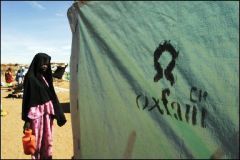Lack of security may force Oxfam to stop Darfur’s operation
September 24, 2007 (KHARTOUM) — Oxfam could withdraw from Darfur if security worsens, its country director said on Monday, amid reports of 10 attacks in the past four days in Sudan’s violent and remote west.
 Despite a peace deal signed last year by the government and one rebel faction and intense international focus on ending the conflict, Darfur has descended into chaos forcing the world’s largest aid operation to evacuate some areas and work at high risk in others to provide assistance to some 4 million people.
Despite a peace deal signed last year by the government and one rebel faction and intense international focus on ending the conflict, Darfur has descended into chaos forcing the world’s largest aid operation to evacuate some areas and work at high risk in others to provide assistance to some 4 million people.
“It’s certainly a strong possibility that if things get any worse Oxfam would have to withdraw,” the British aid agency’s country director Caroline Nursey told Reuters.
“Oxfam is operating at the limits of what it can tolerate as an organisation. In most circumstances if the security situation were as bad as it is in Darfur we would withdraw.
“The only reason we are still there is that we are aware of very large numbers of people who are totally dependent on us for services,” said Nursey, who has worked on Sudan for four years — the last 18 months based in Khartoum.
Oxfam provides water and sanitation to 500,000 people in Darfur and neighbouring Chad, where the conflict that began in Darfur in early 2003 has spilled across the border.
Two weeks ago an Oxfam vehicle was taken in broad daylight by armed men in South Darfur’s massive and volatile Kalma camp. Nursey said the driver overheard the men debating whether to kill the two Oxfam staff members.
Last year an Oxfam driver was killed in North Darfur and staff faced mock executions in an attack in Gereida, South Darfur.
CHAOTIC SCENARIO
Since the conflict began when mostly non-Arabs revolted, accusing the government in Khartoum of neglect, some 200,000 people have died in Darfur and 2.5 million have fled their homes for sprawling camps run by aid groups.
Around 7,000 African Union police and troops have failed to stem the violence, and have been accused of bias for mediating the 2006 deal which many in Darfur’s makeshift camps reject as inadequate. Only one of three rebel factions signed the deal.
Since the peace deal rebels factionalised into more than a dozen rival groups and mostly Arab militias began fighting each other or the government which had mobilised them to quell the revolt, creating a chaotic security scenario.
Rebels, government-backed militias and bandits have all been blamed for recent attacks. Some violence has also been tribal.
Between Sept. 19-22, a U.N. statement reported eight attacks on aid convoys, compounds and police by unknown armed men in Darfur, a vast, arid area the size of France.
On Monday a government official in West Darfur told Reuters Nertiti, in the central Jabel Marra area, was attacked two days ago. One civilian was killed and four injured.
On Sunday nearby Suloo was also attacked. Four policemen were injured.
After months of negotiations and threats, Khartoum accepted a 26,000-strong joint U.N.-African Union force to absorb the struggling AU mission.
But U.N. officials in New York have said Khartoum and the AU have rejected non-African infantry battalions for the force.
Rebels say they prefer non-Africans as the AU had not managed to control the crisis. They took up arms in early 2003 accusing Khartoum of neglecting the remote region.
Officials have also said Western nations have not come up with the necessary logistical and technical support needed to launch the massive peacekeeping mission.
(Reuters)
